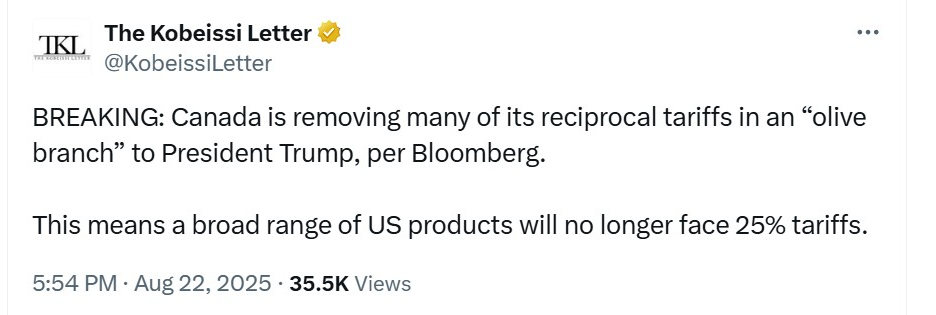Carney Signals Softer US Tarrifs as Canada Prepares for USMCA Review
Canada has said it will soon eliminate US tariffs on the billions of dollars in American goods that it levied as the new Prime Minister Mark Carney shifted trade-policy. The government confirmed that $21.7 billion in US consumer products will no longer face a 25% duty, though tariffs on steel, aluminum, and automobiles will remain.
The decision comes shortly after Carney’s phone call with President Donald Trump. This raised expectations of a less confrontational trade approach as the United States prepared for a review of the US-Mexico-Canada Agreement (USMCA).
Policy Adjustment on US Tariffs
Notably, the rollback applies to a wide range of American-made goods, including orange juice, wine, clothing, and motorcycles. These products had been subjected to Canadian tariffs since March as part of Ottawa’s retaliation against Trump’s protectionist trade agenda.
According to sources, the relief measures only apply to items shipped in compliance with USMCA provisions.

Source: X
Despite the removal of duties on consumer products, Canada has chosen to maintain levies on steel, aluminum, and automobiles. These sectors remain subject to tariffs due to Trump’s earlier imposition of duties on Canadian exports.
Shift in Trade Strategy
The decision marks a notable change in direction for Carney, who during his election campaign promised retaliation against US tariffs. His predecessor, Justin Trudeau, introduced the first set of counter-tariffs in March, targeting over $21 billion worth of American shipments. Carney expanded these measures once in office, particularly against US-made vehicles.
However, since taking office, Carney has shown a more restrained stance. His government began carving out tariff exemptions as early as April, offering relief to certain businesses and manufacturers.
Automakers such as General Motors and Stellantis were given the option of tariff relief if they maintained operations and investment in Canada. While Carney threatened to escalate US import tax in response to Trump’s decision to double steel and aluminum duties, he did not follow through.
Economic Considerations
Economists suggest that Canada’s softer approach reflects current economic realities. Nevertheless, in July, the consumer price index went up by 1.7% compared to a year earlier, well below the inflation target of 2% set by the Bank of Canada.
This information suggested that retaliatory tariffs did not cause inflation as some observers had predicted.
In the meantime, economists at Bank of Nova Scotia estimate the effective US tariff on Canadian products remained below 7%, owing to exemptions built into the USMCA.
These numbers motivated the decision of Ottawa to focus more on trade stability, saving protective measures of industries that were being considered as sensitive.
Positioning Ahead of USMCA Review
The removal of the levies on consumer goods is timely as both nations plan to review the USMCA scheduled later this year. Canada is reported to be doing this to better the negotiation environment and still maintain leverage on matters that parties are yet to work out a solution.
Donald Trump’s administration expressed concern over steel, aluminum, and auto imports, sectors Canada has left untouched in its latest announcement.
Carney’s government restrained approach in response to newer US tariffs, including the White House’s recent increase in duties on Canadian goods tied to the fentanyl trade.
A White House official described Canada’s move as welcome and overdue, confirming ongoing discussions between the two countries. The announcement marks one of the first visible shifts in tone between Ottawa and Washington after months of tense exchanges over US tariffs.
免责声明:本文章仅代表作者个人观点,不代表本平台的立场和观点。本文章仅供信息分享,不构成对任何人的任何投资建议。用户与作者之间的任何争议,与本平台无关。如网页中刊载的文章或图片涉及侵权,请提供相关的权利证明和身份证明发送邮件到support@aicoin.com,本平台相关工作人员将会进行核查。




